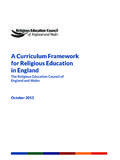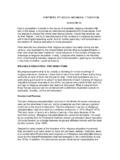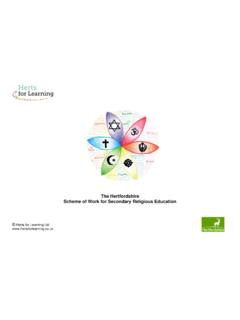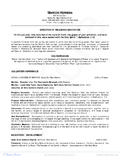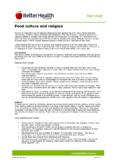Transcription of Using Research in Religious Education to Develop ...
1 U s i n g Re s e a rc h i n Re l i g i o u s E d u c a t i o n t o D e ve lo p Re fl e c t i ve P ra c t i c eA pack to support tutors new to RE initial teacher training by Linda RudgeKeswick Hall Centre for Research and Development in Religious EducationUniversity of East AngliaAbout this packThe focus of this pack is on educational Research covering RE and related areas. The topic is explored from the perspective of tu-tors and mentors new to initial teacher Education (ITE) in the primary and secondary aims of the pack are:1. to introduce definitions of educational research2. to outline a range of Research in RE available to inform practice in ITE;3. to highlight improved access to Research materials and resources;4. to encourage tutors and students, through the QTS standards, to use Research as a teaching tool. PACK R1 SPRING 2007RE-NET - CANTERBURY CHRIST CHURCH UNIVERSITY 11 The Style of the pack is conversational - a podcast without pictures?
2 ContentsSection 1 Definitions of educational re-search and reflec-tive practiceSection 2 The scope of edu-cational Research in RE and related areasSection 3 Resources avail-able to support reflective practice in RE ITES ection 4 Research and the wider professional values of RE teachersSummaryBibliographyIncludes web-links and suggested re-sourcesSection 1 Definitions of educational Research and reflective practiceResearch is about asking questions, finding answers, reflecting on the answers and (sometimes) sharing the findings of your enquir-ies. Educational Research (or Research into Education ) is con-cerned primarily with asking questions about all aspects of teach-ing and learning, about curriculum and professional development, about schools and their daily lives, about Education policy, - about teachers, pupils and students (or learners). For teachers (and their colleagues in other professional settings) reflective practice is intended by national government agencies ( the TDA) to con-vey an intent to evaluate personal practice and to improve or practice where necessary (DfES, 2006).
3 For educa-tional researchers in ITE, or elsewhere, their intentions might be different; reflective (or reflexive) practice is a contested and over-used reading that paragraph, several questions might have arisen for you as a reader; is this right, true, accurate? Do others say the same? Are the fields of enquiry ( Research and reflective practice) being defined accurately? What has it to do with me as a new tu-tor to ITE? These would be valid and not unusual responses, partly because the relevance of educational Research has come into sharp focus during the last ten years, and also because (fortu-nately) people involved in careers in Education within schools and in HE, rarely accept anything at face value. For example, in our readings of academic texts or of student assignments at under-graduate and postgraduate level, we expect to see close refer-encing to evidence that supports the claims of the writer.
4 In schools, mentor partners rarely receive curriculum or ITE part-nership guidance without (at least) asking questions about its provenance and validity of some of the definitions and claims in this pack can be checked through key sources. Three of these sources related to RE will inform much of the material that follows (Grimmitt 2000, Jackson 2004 and Stern 2006). They form a useful core to any ITE bibliography supporting Research in his book (2004), Rethinking Religious Education , Robert Jack-son summarises the recent problems of educational Research in this way:Since the mid-1990s, there has been a debate in Britain about the quality and relevance of educational key underlying question in the debate was whether or not educational Research offers infor-mation and ideas directly relevant to the improvement of practice in schools in order to raise the quality of learning and teaching.
5 (Jackson, 2004, page 143) PACK R1 SPRING 2007RE-NET - CANTERBURY CHRIST CHURCH UNIVERSITY 2In other words, Jackson summarises the highly politicised (and widely publicised) debates between Hargreaves, Tooley and Darby (1998) and Hillage (1998) as being driven by concerns about the value and intentions of educational Research . A form of truth was being offered that to be good (valuable) educational Research , it had to be based on workplace practice, pedagogical issues and the standards agenda (see also Hoult, 2005, chapter 11). This can be applied across the professions that often come into contact with educational Research , not just to teaching and Research in Higher Education Funding Council (HEFCE) quoted in Stern (2006, page 2) and also citable from its website has indicated that Research is original in-vestigation undertaken in order to gain knowledge and and that the actions of routine analysis and testing, or the development of teaching materials, are excluded from their definition for the purposes of the Research and assessment exer-cise (RAE).
6 Of course, this is not the only definition of Research , and judgements passed to ascertain the future funding levels of higher Education , are not the only purpose of Research , but they are powerful motivators and influential drivers. Useful texts used on many Research methods courses are listed in the bibliography (for example Brown and Dowling 1998, Cohen, Manion and Mor-rison 2000, Elliott 1991, Lee 1993, Stake 1995, Woods 1996, Yin 1994).Educational Research as referred to in the sources used so far has been defined much more broadly than Research in initial teacher Education . When we move on to consider educational Research focused on ITE, two key website resources linked to the Teacher Development Agency, provide interesting background material. They also highlight recent government agency moves to encom-pass and control Research -based or reflective (not necessarily to be used interchangeably) practice within their own plans and fi-nancial resources.
7 The Teacher Training Resource Bank gives us another clue to the definition and purposes of educational Research , and to some of its perceived weaknesses; the website says ( About us page) that it aims to: make the Initial Teacher Education (ITE) professional knowledge base more easily accessible reference effective practices in all subject areas and across phases increase the quality and range of ITE resources avail-able raise the status of ITE Research and PACK R1 SPRING 2007RE-NET - CANTERBURY CHRIST CHURCH UNIVERSITY 3 promote and effect change by supporting tested knowledge transfer and adoption strategies provide a personalised support service for teacher educators and those training to teach. These aims imply several things, principally that educational re-search focusing on ITE has been in some way deficient, and that ITE Research and practice are closely linked.
8 They also indicate difficulties in the dissemination of educational Research , and the speed at which website material is expected to be accessed. I will return to the changing nature of educational Research through on-line activity in section 4 of this pack. The other site worth con-sulting is the TDA s where case studies alert teachers to the benefits of continuing professional development (CPD) based on Research and further professional qualifications (see also Hoult 2005, Hanlon 2000, Rudge 2006a, and White 2000).The establishment of educational Research as being closely linked with the initial and continuing Education of teachers has been seen by many commentators as a legacy of Lawrence Stenhouse (1975, 1978, 1985, 1988), expanded by colleagues such as Jean Rudduck (1995), and John Elliott (1991, 2001). However, this leg-acy was not intended to fit neatly into the 2006 model of educa-tional Research apparently designed to improve practice against set curricula and standards.
9 Stenhouse clearly identified Research with democratic processes, with curriculum development, and with the liberation of the teacher from systems that (propheti-cally) he deemed as potentially damaging to the teachers profes-sional standing and self-worth. In summary, educational Research is an activity in which critical evaluation is a central concept. It can be empirical (practical or experiential) or non-empirical (theoretical or hypothetical), and use qualitative or quantitative methods or both, and more. To be valuable (against any criteria - financial or educational) it has to ask questions of developments that are too often accepted as normal - for example the normative developments that Grim-mitt (2000, Chapter 1) refers to in relation to RE curriculum de-velopment and pedagogies. While this is not the place to discuss the history of educational Research , different methodologies and Research practices, the bibliography can point you towards key sources when you are considering the uses of Research in initial teacher Education .
10 The next section deals with the scope of Research related to RE in initial teacher PACK R1 SPRING 2007RE-NET - CANTERBURY CHRIST CHURCH UNIVERSITY 4 TASK 1 Discussion points for tutors new to initial teacher Education or for teach-ing teams in ITEWhat are your previous experiences of contact with educational Research in your own schooling and/or in your professional posts? How confident are you in introducing key concepts and terms in educational Research to your ITE students? Try Schwandt s (2001) Dictionary of Qualitative Inquiry as a source of definitions. An idea to try with students: create a weblog or a wiki2 definition space on the ITE intranet, or create a wall display area in a teaching room with the theme: educational Research is student ideas and key example - Question: is school inspection a re-search process? Answer: no, although it is a form of evaluation (though not, some would argue, educa-tional evaluation) and involves data gathering, the specific commissioning, government intent and the design of the process prevent it from being labelled Research .
